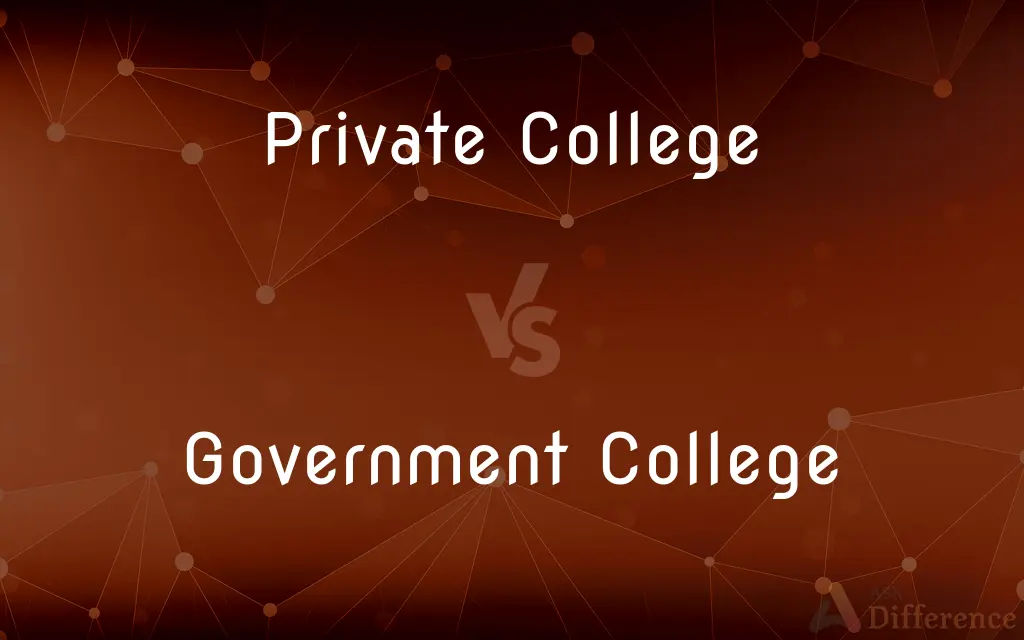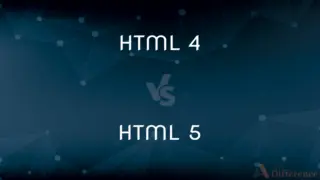Private College vs. Government College — What's the Difference?
By Tayyaba Rehman — Published on January 28, 2024
Private colleges are independently funded and managed institutions, often with higher tuition fees, while government colleges are publicly funded and managed, usually offering lower fees.

Difference Between Private College and Government College
Table of Contents
ADVERTISEMENT
Key Differences
Private colleges are educational institutions operated by private entities, relying on tuition fees, donations, and endowments for funding. Government colleges, alternatively, are funded and managed by government bodies, often making them more affordable due to public funding and subsidies.
In terms of tuition, private colleges generally have higher fees, reflecting their reliance on these fees for operational costs. Government colleges typically offer lower tuition fees, making them more accessible to a broader range of students.
Private colleges often boast smaller class sizes, potentially offering more personalized attention and unique programs. Government colleges may have larger classes but can provide a wide range of programs and resources due to their public funding.
The admission process in private colleges can be more competitive, with some focusing on niche areas of study or offering specialized programs. Government colleges usually have more standardized admission criteria, aiming to serve a larger segment of the student population.
Flexibility and innovation in curriculum can be a feature of private colleges, adapting quickly to industry trends. Government colleges, while offering comprehensive programs, may have less flexibility due to standardized curricula and regulations.
ADVERTISEMENT
Comparison Chart
Funding
Tuition, donations, endowments
Public funding, government subsidies
Tuition Fees
Generally higher
Lower, more affordable
Class Size
Often smaller, more personalized
Larger classes, diverse student body
Admission Process
Can be more competitive
Standardized, broader access
Curriculum Flexibility
Often more flexible and innovative
Standardized, comprehensive
Compare with Definitions
Private College
An institution of higher learning that is privately funded.
She attended a private college known for its excellent business program.
Government College
Typically has larger class sizes and a diverse student body.
The government college had a vibrant campus life with students from various backgrounds.
Private College
Relies on tuition fees, donations, and endowments for operations.
The private college funded its new research lab through alumni donations.
Government College
Provides comprehensive educational programs.
The government college offered a wide range of courses across different fields.
Private College
Often features smaller class sizes and personalized education.
The private college offered small classes and personalized attention.
Government College
Admission criteria are usually standardized.
Admission to the government college was based on a national entrance examination.
Private College
Can have higher tuition fees due to lack of government funding.
Tuition at the private college was higher, but the facilities were state-of-the-art.
Government College
An educational institution funded and managed by the government.
He chose the government college for its affordable engineering courses.
Private College
May offer specialized or niche academic programs.
This private college is renowned for its unique arts program.
Government College
Offers lower tuition fees due to public subsidies.
The low tuition fees at the government college made higher education accessible to her.
Common Curiosities
Are scholarships more available in private or government colleges?
Both offer scholarships, but private colleges may offer more merit-based scholarships.
Is the quality of education different between private and government colleges?
Quality can vary by institution, not necessarily by private or government status.
Are private colleges more expensive than government colleges?
Generally, yes, private colleges tend to have higher tuition fees.
Is student diversity less in private colleges?
Not necessarily, as many private colleges also have diverse student populations.
Can international students attend government colleges?
Yes, many government colleges accept international students.
Are private colleges better for specialized programs?
Private colleges often offer more specialized programs, but this varies.
What are the main differences in funding for private and government colleges?
Private colleges rely on private funding, while government colleges receive public funding.
Do government colleges have larger campuses?
Not necessarily; campus size varies widely in both sectors.
Are there any exclusive courses offered by private colleges?
Some private colleges offer unique or niche courses not commonly found in government colleges.
Do government colleges have more standardized curricula?
Yes, they often follow standardized curricula set by government education bodies.
Can students transfer from a government college to a private college?
Yes, students can transfer between these institutions, subject to each college's transfer policies.
Do private colleges offer more extracurricular opportunities?
This varies, as both types of colleges can have a range of extracurricular options.
Is faculty quality better in private colleges?
Faculty quality depends on the institution's resources and hiring practices, not necessarily on its private or government status.
Are government colleges more likely to be impacted by political changes?
They can be more susceptible to changes in government policies and funding.
Is campus life different in private colleges compared to government colleges?
Campus life can vary greatly depending on the individual institution, regardless of its private or government status.
Share Your Discovery

Previous Comparison
HTML 4 vs. HTML 5
Next Comparison
Shuttle vs. TennisAuthor Spotlight
Written by
Tayyaba RehmanTayyaba Rehman is a distinguished writer, currently serving as a primary contributor to askdifference.com. As a researcher in semantics and etymology, Tayyaba's passion for the complexity of languages and their distinctions has found a perfect home on the platform. Tayyaba delves into the intricacies of language, distinguishing between commonly confused words and phrases, thereby providing clarity for readers worldwide.













































